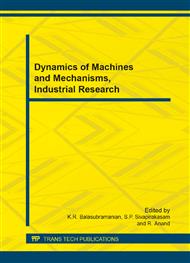p.2229
p.2234
p.2239
p.2244
p.2249
p.2254
p.2261
p.2267
p.2272
Study on Hybridization of Hydraulic System Used in Heavy Machinery
Abstract:
Nowadays with the high fuel costs, the stress for energy saving and green emission of construction machineries, while not sacrifice of the operating performance, safety and dependableness, particularly for hydraulic excavators (HYEXs), are extremely exaggerated. As a result, electro-hydraulic actuators (EHA), that is promoted and with success applied to industry, is recently introduced to HYEXs. The aim of this paper is to propose a new style of excavator - electrical excavator (ELEX) - with energy saving capability using the EHAs. Each of the hybrid actuators is driven by an electrical motor/generator for retrieving a potential energy or a kinetic energy at the time of lowering or slewing stoppage of the excavator. An excavator having a hybrid boom system (HBS) is analyzed. Finally, operating efficiency and energy consumption of the projected excavator area unit are clearly studied. Keywords: Hydraulic excavator; electric excavator; electro-hydraulic actuator; control
Info:
Periodical:
Pages:
2249-2253
Citation:
Online since:
July 2014
Price:
Сopyright:
© 2014 Trans Tech Publications Ltd. All Rights Reserved
Share:
Citation:


